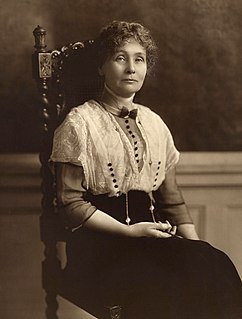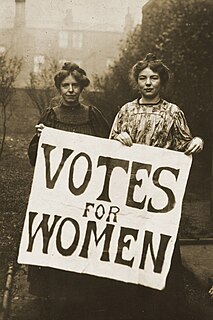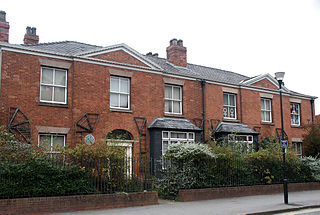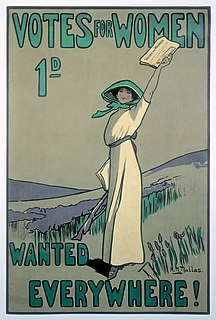 W
WEmmeline Pankhurst was a British political activist. She is best remembered for organizing the UK suffragette movement and helping women win the right to vote. In 1999, Time named her as one of the 100 Most Important People of the 20th Century, stating that "she shaped an idea of objects for our time" and "shook society into a new pattern from which there could be no going back". She was widely criticised for her militant tactics, and historians disagree about their effectiveness, but her work is recognised as a crucial element in achieving women's suffrage in the United Kingdom.
 W
WBlack Friday was a suffragette demonstration in London on 18 November 1910, in which 300 women marched to the Houses of Parliament as part of their campaign to secure voting rights for women. The day earned its name from the violence meted out to protesters, some of it sexual, by the Metropolitan Police and male bystanders.
 W
WSophia Jane Goulden was the mother of suffragette's Emmeline Pankhurst and Mary Jane Clarke and she is credited with having an important forming influence on both her daughters’ political beliefs.
 W
WThe Historiography of the Suffragette Campaign deals with the various ways Suffragettes are depicted, analysed and debated within historical accounts of their role in the campaign for women's suffrage in early 20th century Britain.
 W
W"The March of the Women" is a song composed by Ethel Smyth in 1910, to words by Cicely Hamilton. It became the official anthem of the Women's Social and Political Union (WSPU) and more widely the anthem of the women's suffrage movement throughout the United Kingdom and elsewhere. Activists sang it not only at rallies but also in prison while they were on hunger strike. Smyth produced a number of different arrangements of the work.
 W
WThe Pankhurst Centre, 60–62 Nelson Street, Manchester, is a pair of Victorian villas, of which No. 62 was the home of Emmeline Pankhurst and her daughters Sylvia, Christabel and Adela and the birthplace of the suffragette movement in 1903.
 W
WA suffragette was a member of an activist women's organisation in the early 20th century who, under the banner "Votes for Women", fought for the right to vote in public elections. The term refers in particular to members of the British Women's Social and Political Union (WSPU), a women-only movement founded in 1903 by Emmeline Pankhurst, which engaged in direct action and civil disobedience. In 1906, a reporter writing in the Daily Mail coined the term suffragette for the WSPU, from suffragist, to belittle the women advocating women's suffrage. The militants embraced the new name, even adopting it for use as the title of the newspaper published by the WSPU.
 W
WThe suffragette bombing and arson campaign was a militant protest campaign orchestrated by suffragettes in Great Britain and Ireland between the years 1912 and 1914. The campaign was instigated by the Women's Social and Political Union (WSPU), and was a part of their wider campaign for women's suffrage. The campaign, led by key WSPU figures such as Emmeline Pankhurst, targeted infrastructure, government, churches and the general public, and saw the use of improvised explosive devices, arson, letter bombs, assassination attempts and other forms of direct action and violence. At least 5 people were killed in such attacks, and at least 24 were injured. The campaign was halted at the outbreak of war in August 1914 without having brought about votes for women, as suffragettes pledged to pause their campaigning to aid the nation's war effort.
 W
WThe Women's Social and Political Union (WSPU) was a women-only political movement and leading militant organisation campaigning for women's suffrage in the United Kingdom from 1903 to 1918. Known from 1906 as the suffragettes, its membership and policies were tightly controlled by Emmeline Pankhurst and her daughters Christabel and Sylvia.
 W
WWomen's suffrage in the United Kingdom was a movement to fight for women's right to vote. It finally succeeded through laws in 1918 and 1928. It became a national movement in the Victorian era. Women were not explicitly banned from voting in Great Britain until the Reform Act 1832 and the Municipal Corporations Act 1835. In 1872 the fight for women's suffrage became a national movement with the formation of the National Society for Women's Suffrage and later the more influential National Union of Women's Suffrage Societies (NUWSS). As well as in England, women's suffrage movements in Wales, Scotland and other parts of the United Kingdom gained momentum. The movements shifted sentiments in favour of woman suffrage by 1906. It was at this point that the militant campaign began with the formation of the Women's Social and Political Union (WSPU).
 W
WWomen's Sunday was a suffragette march and rally held in London on 21 June 1908. Organized by Emmeline Pankhurst's Women's Social and Political Union (WSPU) to persuade the Liberal government to support votes for women, it is thought to have been the largest demonstration that had been held at the time in the UK.